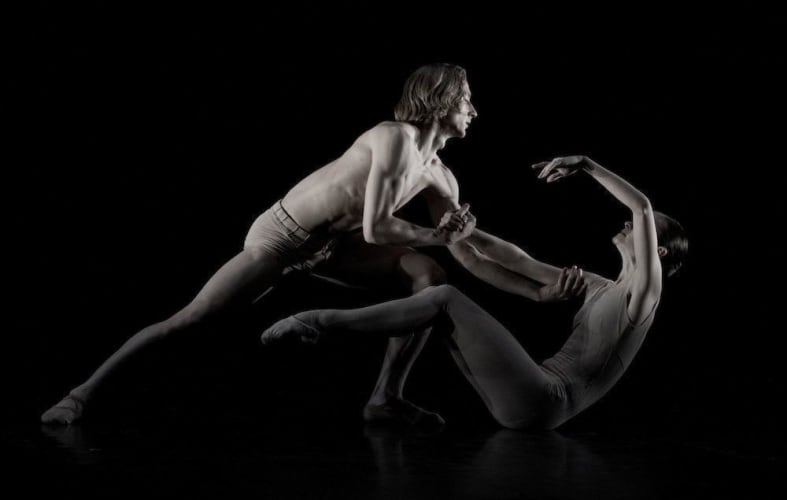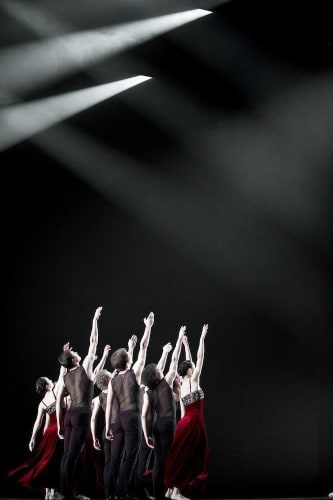Nacho Duato’s artistic direction of the Mikhailovsky Ballet is a brief undertaking—joined in 2011, will depart (though remain as resident choreographer) in 2014—but he is leaving his mark on the repertoire and the dancers. It’s not all about star performers but the rest of the over a hundred-strong company.
Coming from the tradition of Jirí Kylián and Nederlands Dans Theater to the world of Imperial classical ballet has been a learning process for both him and the company. Little used to contemporary techniques, the supremely classical dancers have adapted to his earthy style and idiom as his Bach pieces proved.
Yet the moment in the middle section of Prelude, the last in the triple bill presented in only one performance (the final one in the company’s triumphant season at the Coliseum), when the women are briefly back on pointe is a giveaway. They look in their element.
An arranged marriage of the classical and the contemporary, Nunc Dimittis and Prelude premiered in St Petersburg in 2011, but Without Words, to Schubert’s gorgeous music, was made fifteen years ago, and is my favourite of the three.
On a black stage, below projected close-up images of the dancers on an off-centre panel, to the sound of cello and keyboard, dancers in nude shades of dress emerge and dance tender duets, trios and lonely solos.
Hands cover ears, cover faces, cover eyes, but the beauty of the body cannot be concealed, nor the dancers’ interdependence. Moving as sleepwalkers, hands reach to heaven in the twilight gloom, a man (Leonid Sarafanov) lies in foetal pose, alone on the floor.
The introspective mood carries over to Arvo Pärt’s Nunc Dimittis: searchlight rays streaming from high cathedral windows, incense smoke rising to meet them, voices sing the final song—‘Lord, now lettest thou thy servant depart in peace according to thy word. For mine eyes have seen thy salvation’.
Long-legged Ekaterina Borchenko, only face and arms visible in the gloom, dances a supplicatory solo, framed by kneeling figures. Six couples, men in black, women in red velvet, in formal renaissance formation and clustered groupings appeal to heaven. Bells toll, the burgundy-black curtains at the back part, and Borchenko, arms draped over red silk straps in symbolic cruciform, ascends slowly upwards.
Prelude, to a mix of Handel, Beethoven and Britten, seems a more personal work, a forty-minute investigation, a droll subversion, of the classical dance tradition in a contemporary world.
Sixteen sylphides in floor-length pale tulle skirts crowd a stage open to the bare back wall; men in black dance to the fore. Suddenly, stage sets descend from the flies—a glade for the classical corps de ballet. The girls hide behind their skirts.
Glade flies back up; an idyllic classical silver moon landscape backcloth takes its place. That tumbles down, and is dragged off by the contemporary male dancers. Sarafanov, lonely poet in pale costume, manages to roll off in time.
A Versailles Hall of Mirrors—probably one of the St Petersburg palaces—reflects the Imperial style, but when the chandelier comes down, the women come out on pointe. Point taken.
Sylphides, manipulated marionettes, bob on and off, and a young couple in everyday dress, guided by Duato’s alter ego, take their place—contemporary dance’s rightful place in the cannon. Self-effacing creator and choreographer, job done, walks off.
Duato admits that his time with the company has been as much about teaching them his style as about creating new choreography on them. Set and costumes are his own designs, and the signature sepulchral lighting by Brad Fields is based on Duato’s original ideas, the whole unifying concept, strong imagery and choreographic tics the trademark of a singular vision.
The music is in turn sweet, contemplative, anxious, abrasive, and ominous, the violin, cello, and oboe solos lovely, as is the dancing. The classically trained dancers are special.
A triple bill to suit all tastes: the Sunday audience, the house not full on a sunny afternoon, is delighted. It may not carry the dazzle of the classics, but Spaniard Nacho Duato has put modern dance on the map in St Petersburg.


